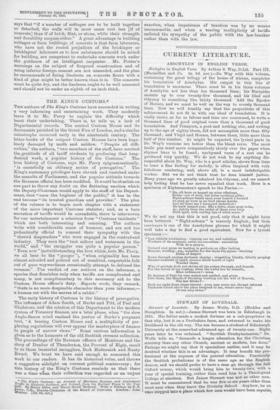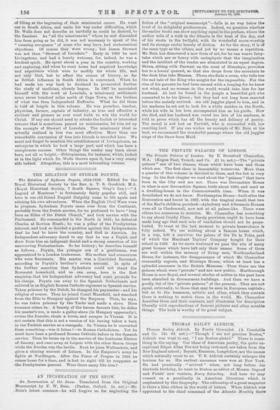STEWA.RT OF LOVEDALE.
Stewart of Lovedale. By James Wells, D.D. (Hodder and Stoughton. 5s. net.)—James Stewart was born in Edinburgh in 1831. His father made a modest fortune as a cab-proprietor in that city, lost it on a Perthshire farm, and returned to make his, livelihood in the old way. The son became a student of Edinburgh University at the somewhat advanced age of twenty-one. Eight, years later he was ordained. "Scottish Presbyterianism," Dr. Wells tells us, "demands a longer education for the Christian, ministry than any other Church, ancient or modern, has done." Perhaps we might say that it specialises earlier, and it may be doubted whether this is an advantage. It may benefit the pro- fessional at the expense of the general education. Practically the Scottish probationer is of the same age as the English deacon, and we should prefer to have a man go through the full Oxford course, which would bring him to twenty-two, with a year of special training, rather than send him to a Theological College at nineteen. But James Stewart was not as other men.• It must be remembered that he was five or six years older than most men when they leave the Divinity School, Anyhow, he at, once stepped into a place which few men would have been aftpabla, of filling at the beginning of _their ministerial career. He went out to South Africa, and made his way under difficulties, which Dr. Wells does not describe as tactfully as could be desired, to the Zambesi. As "all the missionaries" whom he met dissuaded him from going as he did, it was not necessary to speak of the "amazing arrogance " of some who may have had ecclesiastical objections. Of course they were wrong ; but James Stewart was not than "Stewart of Lovedale." Early in 1862 he met Livingstone, and had a hearty welcome, for, indeed, he was a kindred spirit. He spent about a year in the country, working and exploring, and when he went home had acquired knowledge and experience which were to modify his whole life, and not only that, but to affect the course of history, so far PA British influence in South Africa is concerned. When he had made his way back to Scotland he prosecuted further the study of medicine, already begun. In 1867 he associated himself with the work at Lovedale, a missionary settlement some seven hundred miles north of Cape Town, on the borders of what was then Independent Kaffraria. What he did there is told at length in this volume. Ho was preacher, teacher, physician, farmer, captain of industry, as true and effective a civiliser and pioneer as ever went forth to win the world for Christ. If any one should need to rebuke the foolish or interested censure that is sometimes passed on missionaries, let him set up the example of Stewart of Lovedale. The missionary ideal as actually realised in him was most effective. More than one remarkable conversion of foes into friends is recorded here. We must not forget to mention the establishment of Livingstonia, an enterprise in which he took a large part, and which has been a conspicuous success. Other things the reader may learn about hero, not all so bright,—Ethiopianism, for instance, which, looked at in the light which Dr. Wells throws upon it, has a very seamy side indeed. Altogether, tilts is a most interesting volume.

























































 Previous page
Previous page